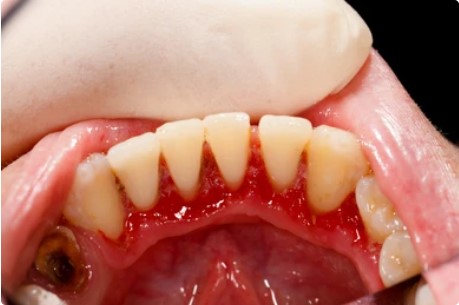 How does gum disease happen?
Gum disease, also known as periodontal disease, typically begins with poor oral hygiene. When dental plaque, a sticky film containing bacteria, accumulates on teeth and gums, it can lead to inflammation and irritation of the gum tissue, known as gingivitis. If left untreated, gingivitis can progress to periodontitis, a more severe form of gum disease.
Periodontitis occurs when the inflammation spreads deeper into the gums and affects the tissues and bone supporting the teeth. Bacteria in plaque produce toxins that trigger the body’s immune response, causing the breakdown of the gum tissue and bone structure. Over time, this can lead to gum recession, tooth loss, and other complications.
Risk factors for gum disease include poor oral hygiene, smoking, hormonal changes, certain medications, genetics, and systemic conditions like diabetes. Regular dental check-ups, proper oral hygiene practices (such as brushing, flossing, and using mouthwash), and lifestyle changes can help prevent gum disease.
How do I treat gum disease?
Treating gum disease typically involves a combination of professional dental care and improved oral hygiene practices at home. Here are some common treatments for gum disease:
How does gum disease happen?
Gum disease, also known as periodontal disease, typically begins with poor oral hygiene. When dental plaque, a sticky film containing bacteria, accumulates on teeth and gums, it can lead to inflammation and irritation of the gum tissue, known as gingivitis. If left untreated, gingivitis can progress to periodontitis, a more severe form of gum disease.
Periodontitis occurs when the inflammation spreads deeper into the gums and affects the tissues and bone supporting the teeth. Bacteria in plaque produce toxins that trigger the body’s immune response, causing the breakdown of the gum tissue and bone structure. Over time, this can lead to gum recession, tooth loss, and other complications.
Risk factors for gum disease include poor oral hygiene, smoking, hormonal changes, certain medications, genetics, and systemic conditions like diabetes. Regular dental check-ups, proper oral hygiene practices (such as brushing, flossing, and using mouthwash), and lifestyle changes can help prevent gum disease.
How do I treat gum disease?
Treating gum disease typically involves a combination of professional dental care and improved oral hygiene practices at home. Here are some common treatments for gum disease:
- Professional dental cleaning: Your dentist or dental hygienist will perform a thorough cleaning of your teeth and gums to remove plaque and tartar (hardened plaque) from above and below the gum line.
- Scaling and root planning: This deep cleaning procedure involves removing plaque and tartar from the tooth surfaces and smoothing out the root surfaces to help the gums reattach to the teeth.
- Antibacterial mouthwash or oral antibiotics: Your dentist may prescribe an antimicrobial mouthwash or oral antibiotics to help control bacterial infection and reduce inflammation in the gums.
- Ongoing maintenance: Once gum disease is treated, it’s important to maintain good oral hygiene habits, including brushing at least twice a day, flossing daily, and using an antimicrobial mouthwash. Regular dental check-ups and cleanings are also essential to monitor your gum health and prevent recurrence of gum disease.
Recent Post
-
Getting Ready for the End of the Year: Your Smile’s Holiday Prep Guide
-
What Scares Dentists Most: The Real Halloween Horror Stories Told by Your Burpengary Dentist
-
Father’s Day: The Gift of a Healthy Smile - Your Local Burpengary Dentist Tells All!
-
Burpengary Dentist - The Controversy and Legacy of Dental Amalgam Fillings
-
How does breast feeding affect oral health? - Your Local Burpengary Dentist Explains




2 Responses